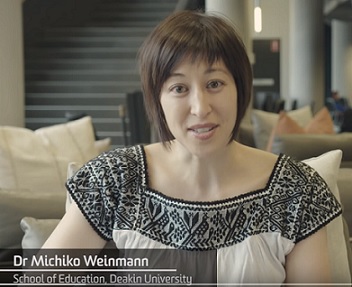Unmasking perceptions of cosmetic surgery among young women
Media releaseIs the rise of celebrity and ‘selfie culture’ to blame for increasing numbers of young women turning to cosmetic surgery in search of attractiveness, individuality and identity?
This is just one of the questions Deakin University researcher Dr Michiko Weinmann seeks to answer through her new research project, ‘Operation Belle’.
Recently launched on crowdfunding site Pozible, Operation Belle involves interviewing young women about their perceptions of cosmetic surgery and using this information to develop an educational kit for secondary schools.
Dr Weinmann, a Lecturer in Education at Deakin University, aims to raise $5,000 to fund the interview process and the development of educational videos and resource booklets.
Dr Weinmann explained that cosmetic surgery – which can be defined as elective surgery for aesthetic purposes – is a very complex topic and it can be difficult for teachers, parents, and peers to know where to start.
“When you’re growing up, finding and defining your identity is hugely important and there are lots of factors that contribute to this process – your friends, your school experience, your cultural background, the subcultures you associate with and, of course, your appearance,” Dr Weinmann said.
“We live in a surgical society, and we’re reminded of this every day when we open a magazine or look at mediums such as videos, social media, magazines, or reality television.
“Today, it affects young Australians more than ever before. In recent years, we’ve been hearing more and more about de-racialisation surgery, cosmetic surgery tourism, bridal surgery before weddings – the list goes on.”
Dr Weinmann noted that Operation Belle follows on from her PhD project which analysed how selected articles in women’s magazines in Australia, Germany, and Japan represented cosmetic surgery.
“It all began when I was living and working in Japan,” Dr Weinmann explained.
“I started to notice that the magazines were full of articles about cosmetic surgery with pages and pages of advertisements for clinics, interviews with surgeons, and ‘before and after’ pics.
“I began to look closer at the issue of how cosmetic surgery is represented in media texts and I realised that this cultural discourse wasn’t just restricted to Japan – that it was happening all over the world.
“For my PhD project, I focussed on the kind of language, images and narratives that are used in women’s magazines and how representations of cosmetic surgery influence the ways identity is constructed within the current ‘surgical’ or ‘makeover’ society.
“Now, with Operation Belle, I want to find out how young women react to these media texts and how they make sense of them. What kind of discussions are they having with friends and family? What do they think about the public discussion?”
Dr Weinmann emphasised that Operation Belle does not seek to support or discredit any particular views or label cosmetic surgery as right or wrong.
“I’m much more interested in listening to the stories of young women’s experiences and representing their voices,” Dr Weinmann said.
“Beauty is capital and cosmetic surgery is becoming so much bigger than facelifts and nose jobs so it’s important that we capture young women’s views about this global phenomenon.”
Beauty is also big business, with recent figures from the Australasian College of Cosmetic Surgery revealing that Australians spend around $1 billion on cosmetic procedures each year.
While Operation Belle focusses solely on young women in their late teens and early twenties, Dr Weinmann hopes to expand the concept to include young men.
“Should we reach $7,000, we’ll launch ‘Operation Beau’ and crank up our efforts to recruit young men as research participants,” Dr Weinmann said.
“Interviews with young men would add diversity of perspectives to a topic mainly discussed by women, about women.
“And, if we happen to raise $10,000, we’ll be able to design and launch a website that would mean the videos and resource materials are just a click away.”
The Operation Belle campaign is a part of Research My World, an ongoing partnership between Pozible and the university, and ends on 10 December.
Share this story
 Deakin University researcher Dr Michiko Weinmann has launched a Pozible campaign for her Operation Belle project.
Deakin University researcher Dr Michiko Weinmann has launched a Pozible campaign for her Operation Belle project.
